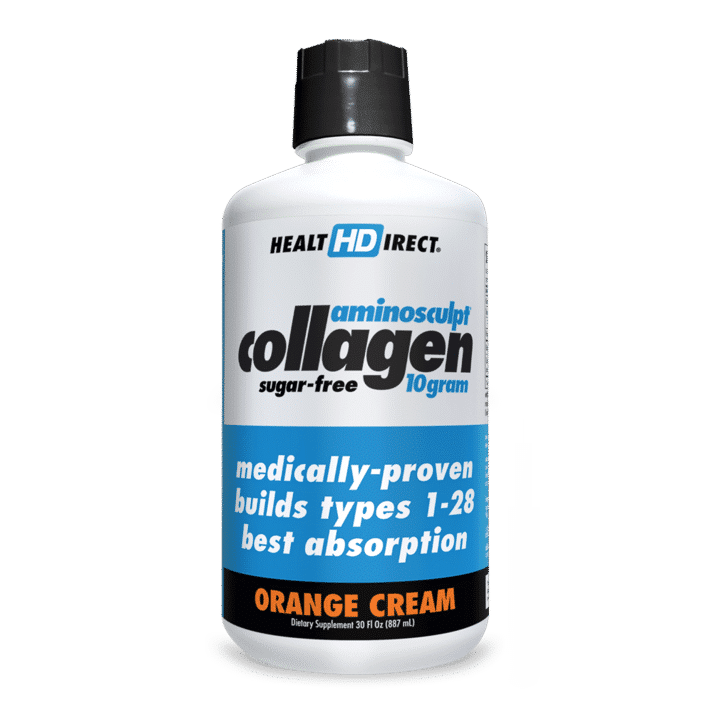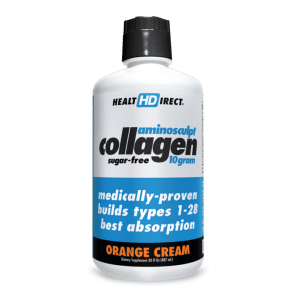Medical-Grade Collagen: the Fountain of Youth for Body Repair?
Liquid Medical-Grade Collagen repairs tissues, builds more lean body mass, and helps you feel more youthful. – Jim Caras, Health Direct
Here at Nutrition World, we have a philosophy of embracing graceful aging. But most people don’t think like that.
I just saw a post the other day that said, “Being in your 30s is kinda like do I have Covid or is this just the way my body feels now.”
We don’t believe you have to accept just getting older. And that’s why we’ve put together an entire toolbox dedicated to helping the 30s and older crowd feel better than Covid every day as they age.
I recently sat down with Jim Caras, with Health Direct to talk about the amazing benefits of liquid medical-grade collagen. And when it comes to aging gracefully, this might be a MUST-USE product.
Here’s what we found out from our discussion and from our research on liquid collagen benefits and drawbacks.
What is Collagen?
Our bodies are mode up of water, protein & fat. The protein in our bodies makes up our lean body mass. Basically, this is our muscle mass. As most of us know by now, our muscle mass burns more calories than fat. The more muscle you have, the more fat you burn.
Thirty percent of the protein in our bodies is collagen. Unfortunately, after the age of about 20, we start losing collagen at a rate of 1% per year. And that means, we’re all losing lean body mass, our big calorie burners.
So, if you’ve ever wondered why you gain weight as you age, or why it’s harder to lose weight as you age, it’s likely because you’ve lost muscle mass.
Colla in the word collagen actually means glue. And collagen is indeed the protein glue that holds our bodies together. It gives our skin and bones structure, connects our tissues together, and it lines our digestive organs. It even helps our blood clot!
Why do we need collagen supplements?
There are many reasons people might want to supplement their diets with collagen. Most people just think they’re aging, and this is how their body works now. Their hair doesn’t look or feel as nice. Their nails aren’t great anymore. They experience new aches and pains, and they’re not as tone as they used to be.
Supplementing with collagen can give your skin more elasticity by producing new skin cells and replacing old ones faster. It strengthens bones and helps us maintain more of our muscle mass.
But here’s who can benefit most from Collagen supplements…
- Anyone who ingests sugar or alcohol. Alcohol dehydrates us, and that causes our skin to lose some of its supple consistency. Alcohol also causes inflammation, which breaks collagen down faster. But sugar might be even more insidious. Because over time, sugar attaches to collagen and hardens it. Causing collagen to lose its elasticity. Bye-bye plump, hydrated, youthful looking skin!
- Sun lovers, watch out! AVA rays penetrate deep into our skin. Not only do they cause sunburns, which can lead to a myriad of unhealthy outcomes, but they also harden our collagen fibers and cause our bodies to incorrectly rebuild our damaged skin cells. And that’s why sunburns later lead to wrinkles and sometimes leathery looking skin.
- Tobacco smokers age faster. In a study titled, Tobacco Smoke Causes Premature Skin Aging, researchers note tobacco smoke degrades collagen and elastin prematurely.
- Menopausal women. Did you know that women lose 30% of their collagen within 5 years of menopause? Supplementing with collagen helps combat that menopause induced collagen loss.
- If you’ve experienced an injury or are recovering from a surgery. As always, we’re not giving medical advice. If you’ve experienced an injury or are recovering from surgery, follow your medical professional’s advice. AND you might want to bring a few collagen supplement studies to your medical appointments to discuss with your provider. That’s because research shows that you heal faster, at a rate of 2 to 1 over a placebo while taking liquid collagen supplements. Researchers see an extremely rapid repair of skin.
Listen to Jim’s story of his mother’s surgery on our podcast interview here. Story starts at 30:13.
- Anyone over the age of 40. Hey, you start losing collagen in your 20s by 1% per year. By your 40s, you could definitely benefit from some supplementation to stave off further loss.
Why was liquid collagen originally used when it came on the market?
So, let’s talk liquid, medical-grade collagen. How did we even start using it?
Liquid medical-grade collagen was originally approved for use in treating burn victims and wound care. It was later approved for cancer nutrition, to help cancer patients hold on to more lean body mass as they sought treatment. It’s also been approved for use in building and repairing skin tissues post-surgery and to combat protein catabolism caused by dialysis treatment. And finally, nursing homes have used liquid, medical-grade collagen to treat bed sores.
What’s the Difference between medical-grade collagen and regular collagen supplements?
Medical-grade collagen is liquid in form. It’s highly concentrated in the amount of collagen you ingest. For example, in 1 oz of liquid, medical-grade collagen, you get up to 18 g of protein collagen. Whereas, with collagen powders, the amount varies anywhere from 2 grams up to 15 grams of protein.
Hydrolized vs Non-Hydrolized
All liquid, medical-grade collagen is hydrolized. Not all collagen powders are hydrolized. So, what does that even mean?
A strand of collage is as strong as steal. That’s why your body will digest little to none of the collagen supplements you use if they’re not hydrolized. Why spend money on supplements that your body can’t even absorb?
When collagen is hydrolized, it’s broken into peptide form using natural enzymes. Not only does the peptide form of collagen make it easy for your body to absorb, it also stimulates your body to make more collagen on your behalf. And because the collagen is so refined, it makes it virtually allergen free. That’s why people who are allergic to other proteins aren’t allergic to liquid, medical-grade collagen.
What are collagen sources?
We often hear you can get collagen from lots of food sources like fish, poultry, beef, eggs, dairy, legumes, and soy. Jim Caras shared that because collagen is as strong as steel, it’s very difficult to convert collagen from food sources into something your body can absorb.
He also noted, “there’s no such thing as a vegan collagen.” So we wanted to clarify what he meant.
Collagen contains 2 amino acids that other proteins don’t have. Hydroxyproline and Glycine.
Vegan collagen supplements are typically made from legumes and soy. Why? Because these foods contain the right vitamins and minerals that are found to help our bodies produce collagen. There are no known plant-based sources of hydroxyproline, one of the main amino acids that make up collagen. However, vegans and vegetarians are encouraged to make sure they have proline, vitamin C, Zinc, and Iron in their diets, which is what your body uses to produce it’s own collagen.
Hydroxyproline is especially important because it’s what holds things together to repair and build proteins in our bodies. And thus, why Jim Caras says they are no vegan collagen supplements.
What about other protein sources?
We know collagen is a protein. So, can we use it to boost overall protein in our diets? Well, maybe.
Collage is an incomplete amino acid. However, it’s high in high-nitrogen amino acids. Specifically collagen has two times more high-nitrogen amino acids than whey protein. That means it can definitely be used to help you build and repair your body and help you build your lean body mass. And it may be more effective than whey protein in doing it.
What are the different types of collagen?
There are actually 28 types of collagen. But we’ve found you don’t need a supplement with all 28 types of collagen. We like to say the body has wisdom and knows what to do when we give it what it needs.
The body has wisdom and knows what to do when we give it what it needs. Share on X
Type 1 makes up 90% of the collagen in our bodies. Not only that, but when you add type 1 to your supplement regimen, it prompts the body to produce the other 27 types of collagen. The body is wise. Give it a little boost, and trust it to do the rest of the work for you.
How long does it take to see results?
Our customers tell us they see a difference within 4 – 8 weeks of taking liquid collagen supplements. And that’s pretty amazing!
They tell us their skin looks better; they’re losing weight or keeping it off; they’re sleeping better; and their bodies don’t ache as much.
Read about natural ways to increase your body’s production of collagen as you age in this article here.
Does collagen really help you sleep better?
Here’s the thing. The number one best time to use liquid collagen is at bed time on an empty stomach. It’s just best for the way your body absorbs the collagen and puts it into action. But here’s another benefit to taking collagen at night.
Studies on glycine show it induces deeper, better sleep because it helps lower the core body temperature. And 1 oz of liquid, medical-grade collagen gives you 3.2 grams of glycine. So, the reports from our customers are evidence-based. They say they sleep better while taking collagen supplements, and science tells us why that’s probably true.
So, what’s the catch?
Don’t great things always have a catch? Well, the one possible drawback to taking liquid, medical-grade collagen might be the taste. Because the product contains a high amount of collagen, it’s super thick. And the taste is, well…not candy.
But hey, it’s a supplement, not a snack. And you can add water to it, which mostly dilutes the taste.
As a matter of fact, the producer of our favorite liquid, medical-grade collagen has a few ideas for how you can enjoy your collagen supplement.
Take some sparkling water, put 1 oz of the liquid, medical-grade collagen in it. You’ll experience a hint of the collagen flavor. But more than that, you’ll have a high protein, sugar-free soft drink.
Or in the summertime, freeze it 1 oz of the collagen in water. It makes great sugar-free popsicles for the kids. Yes, you heard that right, collagen supplements are great for kids too!





